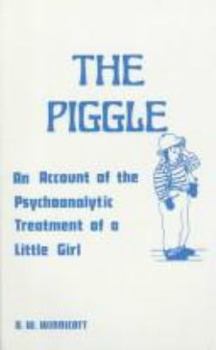The Piggle: An Account of the Psychoanalytic Treatment of a Little Girl
Select Format
Select Condition 
Book Overview
Between the age of two and five, a little girl nicknamed 'the Piggle' - seriously disturbed by the birth of a younger sister - visited Dr Winnicott on sixteen occasions. A verbatim account of her... This description may be from another edition of this product.
Format:Paperback
Language:English
ISBN:0823681890
ISBN13:9780823681891
Release Date:January 1977
Publisher:International Universities Press
Length:201 Pages
Weight:0.66 lbs.
Dimensions:0.5" x 6.4" x 8.7"
Customer Reviews
2 ratings
Piggle
Published by Thriftbooks.com User , 17 years ago
This is a illuminating account not only of a little girl but of D.W. Winnicott himself, the master analyst.
Finding the Piggle
Published by Thriftbooks.com User , 21 years ago
The Piggle is an account of a child analysis, a case history. That child is Gabrielle, nicknamed "the piggle" and she was two and a half years old at the onset of her treatment. The Piggle is a delightful book to read. Though it is a professional psychoanalytic text, it is not stuffy or full of jargon. This book is a very good starting point for learning about how children's minds work and the role that fantasy and play have in healthy psychological development. Reading it is like learning your A. B. C's as a song rather than having to learn by rote. Gabrielle's parents brought her to Dr. Winnicott's office because she had trouble sleeping, anxiety problems and because she was not herself. Other symptoms included nightmares, difficulty controlling her temper, difficulty in concentration, and listlessness. When she was first seen, she seemed to withdraw from relationships with people. This flight from other relationships and premature independence caused alarm her parents. Gabrielle's sister was born when Gabrielle was 21 months old. The Piggle exhibited jealousy and regressive behaviors (acting more childishly than she was developmentally). Gabrielle presented what some people might call alarming fantasies. They were fantasies gone wild and they consumed her so that she seemed to live inside them somewhat like an adult psychotic might do. The fantasies Gabrielle presented have a "through the looking glass" quality at times. She had trouble telling reality from her dreams. Verbally, a complex story emerged full of "babacars," "yams," "sush babies," "moo's burrr's" and "bryyyyyh babies." These were her made up words for things or people in her world.Because the child lived far from Dr. Winnicott's office, her parents had to travel a long way by train to be seen. For this reason she was seen on demand or whenever it seemed necessarily. There were only 14 sessions during the whole course of treatment which began when she was two and a half and ended when she was aged five. During the beginning of the treatment Gabrielle was having frequent nightmares. She would not admit to being herself saying rather that she was this or that imaginary person. She would often say that "the piggle" had gone away. She was full of aggressive feelings. Many of these fantasies appeared to relate to her mother's pregnancy. The "Sush Baba" was her sister Susan. Her parents suspected Gabrielle had tried to become prematurely independent when Susan was born but could not sustain this because she did not have the emotional skills and resources to do so. They are quoted as saying, "when Susan was born, Gabrielle seemed somehow thrown out of her mold, and off from her sources of nourishment (p. 20). Gabrielle is concerned with "nastiness" (p. 99), her own and that of others. About this issue, Winnicott shows us how people, even children symbolize their experiences in interlocking images, ideas, and feelings. Strange and complex men





